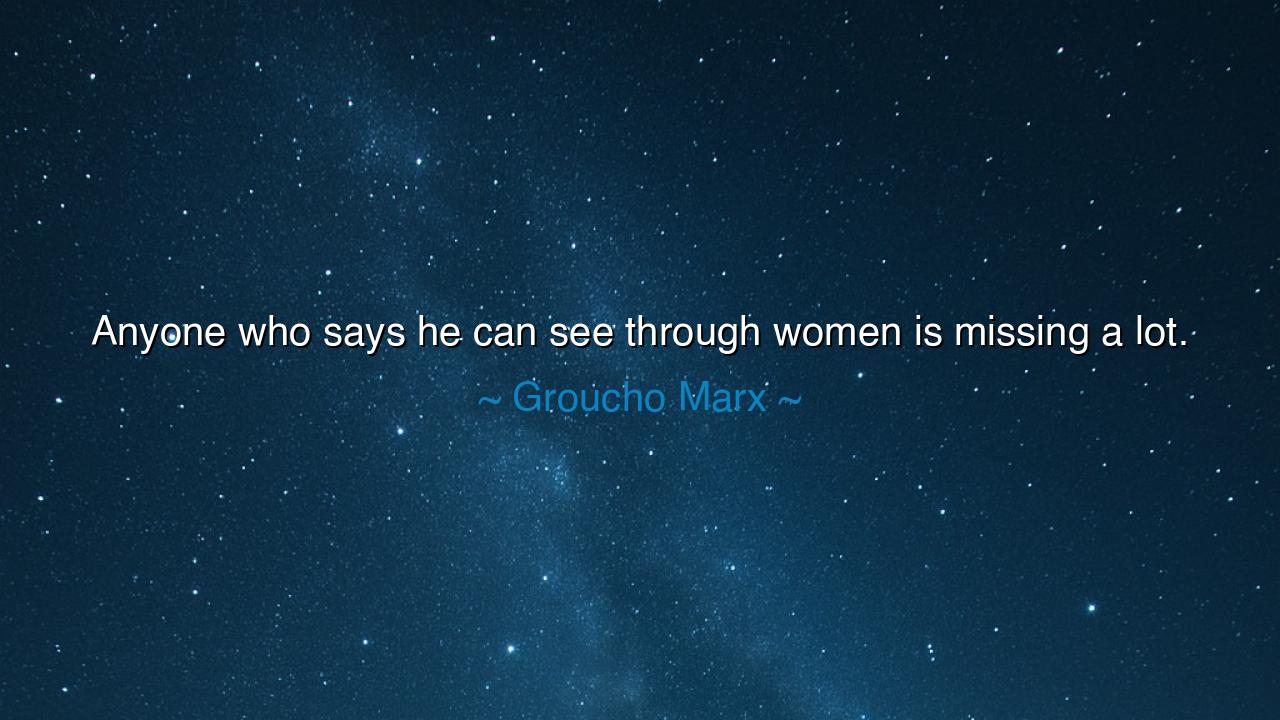
Anyone who says he can see through women is missing a lot.






“Anyone who says he can see through women is missing a lot.” — Groucho Marx
In this dazzling line of wit, Groucho Marx, that philosopher of laughter disguised as a fool, offers a truth far deeper than it first appears. On the surface, it is a jest about the mystery of women — a clever twist of words meant to amuse. Yet, beneath the comedy lies the gleam of ancient wisdom: a reminder that the mystery of the human heart, especially the feminine heart, is not meant to be solved or seen through, but to be cherished, pondered, and admired. To “see through” someone is to claim full understanding — and Groucho, with his sly humor, tells us that such arrogance blinds more than it enlightens. Those who believe they fully grasp the nature of another soul, particularly one as deep and layered as a woman’s, are, indeed, “missing a lot.”
The origin of this quote belongs to Groucho’s long reign as one of America’s sharpest minds in comedy and commentary. His humor was never merely laughter for its own sake — it was insight disguised as absurdity, truth wrapped in jest. Like the sages of old, he taught through irony, revealing wisdom by denying it. In a century when men often spoke confidently of understanding women — or, worse, sought to define them — Groucho’s words stood as both mockery and reverence. With one flick of his verbal sword, he reminded the world that mystery is not weakness, and that the wise do not seek to reduce what they cannot comprehend.
The ancients would have understood this lesson well. In the myths of Greece, woman was both the muse and the mystery — from Aphrodite, born of sea-foam and passion, to Athena, sprung from the mind of Zeus yet wiser than her father. Men who sought to “see through” them often failed or fell. The hero Odysseus, wise among mortals, never claimed to see through Penelope; he revered her cunning and patience, knowing her mind was her strength. In her mystery lay her greatness. So too does Groucho’s humor echo this eternal truth: that what cannot be fully known is not a puzzle to solve, but a wonder to behold.
There is a deeper human wisdom here beyond the dance of gender. To “see through” another person — man or woman — is to presume mastery over their inner world. It is to trade wonder for certainty, intimacy for arrogance. Groucho’s jest, then, becomes a parable against all forms of spiritual blindness masquerading as insight. The one who claims to “see through” others — to understand every motive, every desire — misses the beauty of their depth, the infinite possibilities that lie hidden behind every smile, every silence. Life itself, like the feminine spirit, is not meant to be transparent, but radiant. It shines through layers, through shadow and light, and only the patient and humble can truly see it.
History offers many who learned this truth. Consider Leonardo da Vinci, whose fascination with the feminine form led to the creation of the Mona Lisa, that most mysterious of portraits. He did not “see through” her; he saw into her — and stopped there, content to wonder. Her smile, half-known and eternal, continues to confound the world because it captures what Groucho, in his jest, hints at: that mystery is the very soul of beauty. Those who demand full comprehension destroy the very thing that makes life and love worthwhile. To leave some things unsolved, to allow room for awe — this is not ignorance, but wisdom.
Yet, Groucho’s humor carries also a note of humility and respect. His wit was not cruel but knowing. He understood that laughter could soften truth where sermons could not. When he says that those who “see through women” are missing much, he means that life’s richest experiences — love, admiration, curiosity, partnership — thrive not in control, but in discovery. The wise do not claim to know all; they keep learning, keep listening, keep marveling. Mystery is not a wall between souls but a bridge — a space where wonder and affection meet.
So, my child, take this teaching to heart: do not seek to see through others — seek to see into them. Do not strip the world of its mystery in your hunger to understand it. Whether in the heart of a woman, the workings of a friend, or the depths of nature itself, leave room for wonder. The shallow eye seeks transparency; the wise eye sees depth. To miss “a lot” is to lose the poetry of existence — the slow unfolding of truth that comes not through mastery, but through reverence and patience.
Let your relationships, your studies, your very life, be guided by this ancient humor wrapped in Groucho’s laughter. The world is not a problem to be solved, but a mystery to be embraced. If you can live with that mystery — if you can laugh, love, and learn without ever claiming to “see through” it all — then you will have understood the deepest joke of all: that wisdom begins where certainty ends, and that what we cannot see through often holds the greatest light.






AAdministratorAdministrator
Welcome, honored guests. Please leave a comment, we will respond soon